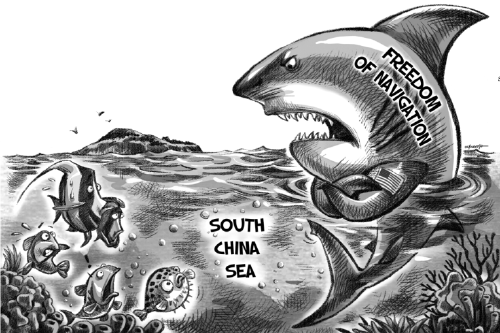Freedom of navigation: a tale of two interpretations
Updated: 2016-02-17 07:59
By Zhou Bo(China Daily)
|
||||||||
 |
|
LI MIN/CHINA DAILY |
Freedom of navigation is a buzzword of the day. Admiral Harry B. Harris Jr, Commander of the US Pacific Command, said on January 27, 2016, that the US navy will "continue down the path of freedom of navigation operations" and "you will see more of them, and you will see them increasing in complexity and scope".
Both China and the United States agree to freedom of navigation, a fundamental principle of the law of the sea. But they have different interpretations of it.
China and more than 20 other developing countries, such as Brazil, India, Vietnam and Malaysia, believe that military activities, such as the close-in surveillance and reconnaissance by a country in another country's Exclusive Economic Zone, infringe on a coastal state's security interests and therefore cannot be simply categorized as freedom of navigation.
The US, however, maintains that military activities fall within freedom of navigation and other internationally lawful uses of the sea.
The US is never shy of claiming freedom of navigation as its higher moral ground. But the irony is it still refuses to ratify the UN Convention on the Law of the Sea (UNCLOS). Even President Barack Obama admitted that "it's a lot harder to call on China to resolve its maritime disputes under the Law of the Sea Convention when the United States Senate has refused to ratify it".
China, on the other hand, upheld freedom of navigation as a principle in line with the UNCLOS as early as 1998 in its Law on the Exclusive Economic Zone and the Continental Shelf.
US "freedom of navigation" naval operations are even a contradiction to the US' claimed policy of taking no position on competing territorial claims in the South China Sea.
- Global health entering new era: WHO chief
- Brazil's planning minister steps aside after recordings revelation
- Vietnam, US adopt joint statement on advancing comprehensive partnership
- European border closures 'inhumane': UN refugee agency
- Japan's foreign minister calls A-bombings extremely regrettable
- Fukushima impact unprecedented for oceans: US expert

 Stars of Lijiang River: Elderly brothers with white beards
Stars of Lijiang River: Elderly brothers with white beards
 Wealthy Chinese children paying money to learn British manners
Wealthy Chinese children paying money to learn British manners
 Military-style wedding: Fighter jets, grooms in dashing uniforms
Military-style wedding: Fighter jets, grooms in dashing uniforms
 Striking photos around the world: May 16 - May 22
Striking photos around the world: May 16 - May 22
 Robots help elderly in nursing home in east China
Robots help elderly in nursing home in east China
 Hanging in the air: Chongqing holds rescue drill
Hanging in the air: Chongqing holds rescue drill
 2.1-ton tofu finishes in two hours in central China
2.1-ton tofu finishes in two hours in central China
 Six things you may not know about Grain Buds
Six things you may not know about Grain Buds
Most Viewed
Editor's Picks

|

|

|

|

|

|
Today's Top News
Liang avoids jail in shooting death
China's finance minister addresses ratings downgrade
Duke alumni visit Chinese Embassy
Marriott unlikely to top Anbang offer for Starwood: Observers
Chinese biopharma debuts on Nasdaq
What ends Jeb Bush's White House hopes
Investigation for Nicolas's campaign
Will US-ASEAN meeting be good for region?
US Weekly

|

|









